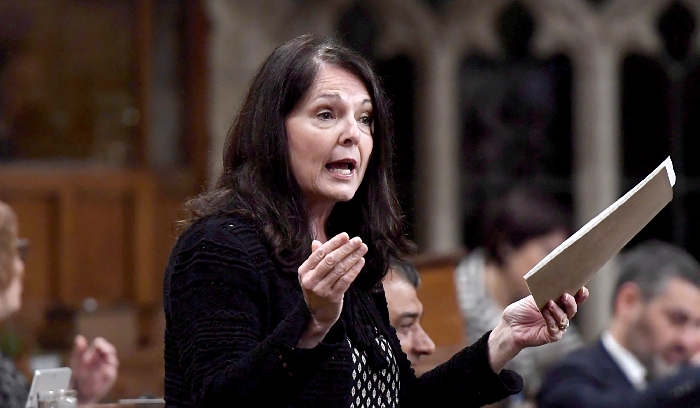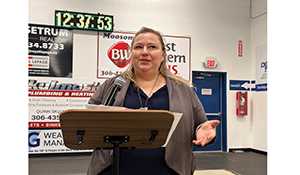Wagantall begins debate on sex-selective abortion bill
April 19, 2021, 1:53 pm
Kevin Weedmark


Cathay Wagantall, Member of Parliament for Yorkton-Melville, began debate on her private member’s bill, the Sex-Selective Abortion Act (C-233), on Wednesday, April 14.
“Over one year ago, I introduced this bill to defend baby girls in the womb who are terminated simply because they are girls,” said Wagantall. “Eighty-four percent of Canadians believe sex-selective abortion has no place in our country. This vast majority of both pro-choice and pro-life Canadians believe it should be illegal to end a pregnancy due solely to the sex of the child.”
Wednesday marked the first of two hours of Second Reading debate on the bill that would prohibit a medical practitioner from knowingly performing an abortion if the sole reason for the abortion is the sex of the child.
Throughout her speech, Wagantall spoke to how gender discrimination is at the heart of sex-selective abortion. Inequality between the sexes remained the focus of her comments on Wednesday evening.
“While some oppose and some promote [abortion], we can all stand together, side by side, against sex-selective abortion, as we all have a moral obligation to stand against gender inequality,” she stated. “No issue important to Canadians should be vetoed from debate.”
“It is unfortunate that Liberal, New Democratic, and Bloc Québécois MPs used yesterday’s debate to represent the tiny minority of Canadians—just 16 per cent—who believe sex-selection abortion should continue to be legal,” continued Wagantall. “They do not represent the views of traditionally pro-choice Canadians, who are also in favour of this bill.”
Karen Vecchio, Member of Parliament for Elgin-Middlesex-London (ON) and a Conservative colleague of Wagantall’s, also contributed to the debate. As a pro-choice woman, she spoke to the need for a rational debate on the practice of sex-selection and Canada’s lack of any law to address it.
“I support women having a choice and when I speak on this issue, I recognize that there are many Canadians unaware of what our laws in Canada are,” stated Vecchio.
“Many members have decided to stop listening before the conversation even begins. Does this issue deserve to be studied? Is there an issue that is actually occurring here in Canada that needs to be addressed? We cannot know if we are not willing to even start the conversation.”
Wagantall said after the debate that she was happy to be able to bring the issue forward.
“I was really pleased to stand up in the house and present it,” she said. “It’s been 15 years since abortion was debated in any way in the House of Commons, and because the issue was so specific around sex selective abortion, an issue that was very much supported by the majority of Canadians, it was an honor to stand and speak to it,” she says.
Wagantall says the bill would not in any way incriminate women, but make it illegal for a medical professional to perform an abortion knowing that it is solely on the basis of sex.
“It doesn’t actually in anyway incriminate the woman or ask her to reveal why she’s having an abortion and I think that’s a bit of a challenge in communication,” she says. “What it does is, it makes it illegal for a medical professional to knowingly perform an abortion when the full purpose is sex selective abortion.”
She says many Canadians are not aware of the laws surrounding abortion in Canada and that other countries have laws in place to safeguard females in the womb. She says her bill sends a message about Canadian values toward women.
“I stress, even when I talk to folks who say ‘well, it doesn’t happen a lot here compared to China or India,’ but both those countries also now have sex selective abortion laws, and also have very strong controls on the use of ultrasounds, you have to be registered with the country and only do it for medical purposes. So there’s a multitude of things that need to be done, but it does hinge on saying in our criminal law what our values are as Canadians. We have a law already on sex selective choosing of an embryo, invitrofertilization, that’s illegal. There are concerns there or even with female genital mutilation, it’s illegal in Canada.
“So laws serve many purposes and one of them is to say as Canadians we value human rights, we value equality and a line in the sand that the majority of Canadians have set in regards to abortion.
“I’m educating, I think, a lot of people and at the same time saying if we’re the feminist country, the human rights, equality, all these things that we as individuals and as a government say are important to us, you can’t have a double standard. You need to express what your values are within your country and also internationally and so that’s a significant part of the rational of why I did it as well.”
Wagantall says she’s pleased that she is able to put forth the bill with no restrictions from her party.
“Whether or not I have a lot of support, I highly encouraged people on the other side of the floor to do what I get the opportunity to do, and what we do in our party, and I hope Canadians see that—that we are the only party that respects my right as a member of parliament to bring forward a private members bill of my choice.
In other words, your party can’t say ‘no you can’t do that,” and I greatly appreciate that within my party. Erin (O’Toole) is a pillar on his stance since becoming leader that we can vote our conscience on these issues. Will there be pressure? Will there be conversation? Will there be debate? Oh yes, lots of that! But we have that freedom.”
O’Toole has chosen to vote against Wagantall’s motion, but she says she expected that.
“I was expecting that. I’ve had very good conversations with him since he became the leader, right after he became the leader, and then later on in regards to my bill. So I was aware of his concerns.”
She says this is a very important issue for her.
“I’m doing it for a multitude of reasons but the main one is to protect baby girls in the womb. It’s an issue internationally and people think it’s not happening here and when they find out it is they are surprised by it.”
Wagantall’s bill will go through a second hour of debate at some point.
“That was the first hour of debate. In the second reading, so I’m now dropped to the bottom of the list and there are 15 that are dealt with at a time. They think it could be around May 24 that I’ll have the second hour of debate. So we have a lot more time in there to continue to work on it. While we’ll be presenting an e-petition we put out for just a few weeks before, I did my first hour and got over 10,000 signatures supporting the bill and of course there’s paper petitions as well.”
Does Wagantall think there is a disconnect here between how most Canadians feel and how most politicians would feel?
“I believe so and that’s what I said,” she says. “There’s a change of heart in Canada and it’s not a change of heart due to people who were once thinking sex selective abortion was okay to now it isn’t. It’s that they didn’t know that we don’t have laws and it’s educating the public to realize that when it comes to abortion we all think that there’s a law you can’t do it past that first trimester, but when they find out there’s no law, that means you can have an abortion from the moment of conception until that child is being delivered.
“Does that happen a lot? Of course that was part of the argument yesterday, that well no this doesn’t happen a lot. Well how many babies count before you decide that it’s important, right? So put the framework there, that then supports what you say is your concept of legal abortion in Canada. It’s only legal because there are no laws.
“I’m hoping they will pass this bill at second reading to go to committee, where we would then be able to have medical professionals and talk because people say ‘oh well, you’re criminalizing doctors, that’s so terrible.’ Well at my press conference, Dr. Williams from Calgary, who is an amazing doctor, she just said ‘doctors are asking for frameworks.’ Many medical associations have done their research and it’s in their journals and it shows that it’s a growing problem.
“The Society of Obstetricians and Gynecologists have said they don’t want ultrasounds being used to determine the sex of the child for the purpose of abortion and they are against sex selective abortion. A number of psychologists, physicians and surgeons from Ontario, British Columbia and Saskatchewan have come out and said ‘we don’t agree with this.’ But they don’t make the laws, we do.
“And the way that it is worded, it is the same concept as in the assisted dying legislation where doctors would be penalized if they didn’t do things the way that they should and doctors understand that, and again the goal isn’t to put doctors in prison, it’s to give them the tools.
“We want the federal health minister working with the provincial health counterparts and the various medical bodies to create the framework of how this information would be communicated to a person asking for an abortion. So we’re not saying, you have to tell us why you’re having this abortion and if it’s the sex selection, you know that’s illegal. The approach can be something along the lines of this is information that you need to know when you come to ask for an abortion, to be provided with this information that in Canada it is illegal to have a sex selective abortion and you’re made aware of that.
“I feel well prepared and well supported because people have said “well you’re pro-life so this is just your way of getting things moving so you can basically make all abortions illegal,” and I say to them, look, out of that 84 per cent of Canadians (who do not support sex selective abortion), only 13 per cent are pro-life. Which means all the rest are on that pro-choice spectrum.
“So I’m responding to what Canadians want and the expectation was we would have laws that would protect the fetus, set parameters around when an abortion can take place. Since most Canadians think it’s in that first three months, then we should work as a country to reflect what every other country has done and set those parameters for that service, for that surgery.”



































